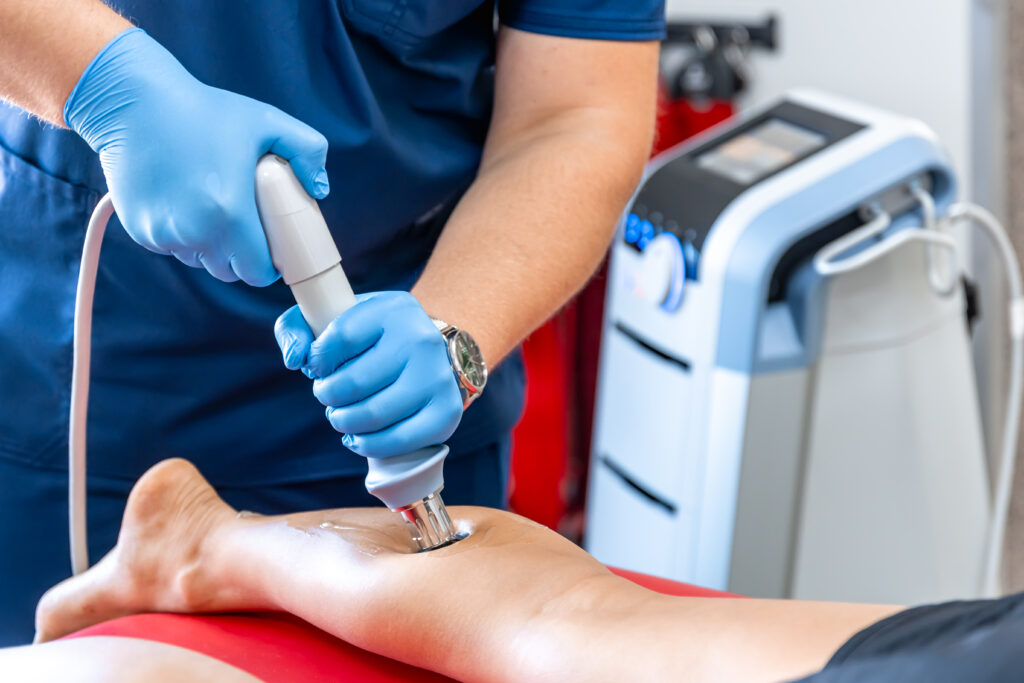Shockwave therapy is a non-invasive medical treatment that utilizes high-energy sound waves to promote healing and pain management in musculoskeletal conditions. These sound waves interact with tissues, stimulating the body’s natural healing processes to repair damaged areas and reduce pain.
Shockwave therapy has become a popular option for treating chronic pain, tendonitis, plantar fasciitis, and other conditions affecting muscles, tendons, and ligaments.

What Are the Different Shockwave Therapy Types?
Shockwaves are powerful acoustic waves generated by a device and transmitted through the body to the targeted area. There are three main types of shockwave therapy, distinguished by their wave characteristics and treatment effects: focused, radial, and unfocused.
Focused Shockwave Therapy
Focused shockwave therapy delivers high-energy waves directly to the target area, penetrating deep into the tissues. This type is particularly effective for treating deep-seated conditions such as chronic tendinitis, calcifications, and non-healing fractures. The precision of focused shockwaves makes it ideal for targeting specific pain points and promoting deep tissue repair.
Radial Shockwave Therapy
On the other hand, radial shockwave therapy, while not a true shockwave, employs lower-energy mechanical pulses that spread radially outward from the applicator. These waves are less intense than focused shockwaves, making them suitable for treating larger surface areas and conditions closer to the skin, such as muscle spasms, myofascial trigger points, and superficial tendinopathies. Radial shockwave therapy is often used for its ability to cover more extensive treatment zones.
Unfocused Shockwave Therapy
This therapy uses low-intensity, broad-spectrum waves to stimulate blood flow and cellular activity across a larger and deeper treatment zone. This type is often used for pain management in larger areas and can be used for conditions like chronic lower back pain, sports injuries, wound healing, and neuropathy.
How to Choose the Right Type for Your Condition
Selecting the appropriate type of shockwave therapy depends on various factors, including your medical history, current health condition, and the recommendations of your healthcare provider. Here are some steps to help you make an informed decision:
- Consult with a Healthcare Provider: Discuss your symptoms and medical history with a professional who can provide tailored advice.
- Consider the Specific Condition: The nature and location of your condition will influence the choice of therapy. Deep tissue issues may benefit more from focused shockwave therapy, while surface-level problems might be better addressed with unfocused shockwave therapy.
- Evaluate Your Pain Tolerance: Some types of shockwave therapy may cause more discomfort than others. Discuss your pain tolerance with your healthcare provider to choose the most comfortable option.
- Follow Professional Recommendations: Trust the expertise of your healthcare provider to recommend the best type of shockwave therapy based on their assessment of your condition.
Benefits of Choosing the Right Shockwave Therapy
Selecting the appropriate form of shockwave therapy offers several advantages:
- Improved Treatment Outcomes: Matching the therapy type to your specific condition ensures the sound waves reach the target tissue most effectively, leading to better results.
- Faster Recovery Times: Precise targeting allows for more focused healing, potentially reducing your overall recovery period.
- Reduced Side Effects: Since proper therapy selection minimizes unnecessary effects on surrounding tissues, the risk of side effects may be lower.
Making the Best Choice for Your Health
Shockwave therapy offers a range of options to suit different medical conditions and patient needs. By understanding the differences between focused, radial, and unfocused shockwave therapies, you can make an informed decision that aligns with your health goals. Remember, professional guidance is crucial in selecting the right type of shockwave therapy for your specific condition, ensuring you receive the most effective and efficient treatment possible.
